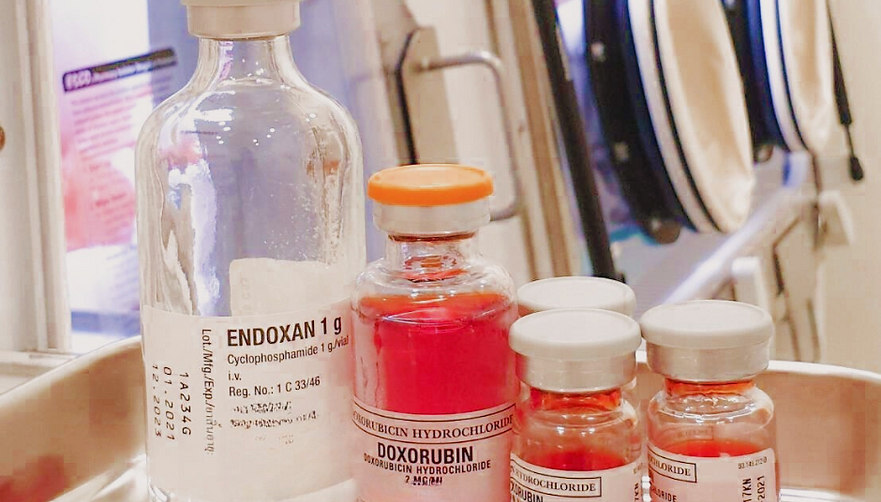
Drug Treatment Services
A new era in cancer treatment: Targeted and personalized medicine
Current cancer treatment approaches have entered the era of "precision medicine," which focuses on designing drugs that specifically target the molecular mechanisms of cancer cells.
Namarak Hospital combines expertise in oncology with advanced biomedical technology to develop treatment plans that deliver optimal outcomes, with a focus on patient quality of life.
Drug treatment guidelines at Namarak Hospital
Correct breast disease diagnosis from the beginning is the key to the most effective treatment. Namarak Hospital provides diagnostic services using cutting-edge technology and a team of specialized doctors to confirm the type of disease, plan treatment, reduce the risk of misdiagnosis, and accurately identify the type of disease, leading to individualized treatment.

1. Convenient and manageable chemotherapy (Modern Chemotherapy)
Chemotherapy for breast cancer treatment has been developed to be safe, accessible, and less impactful on patients' quality of life.
Namarak Hospital designs a medication administration system and a guideline for selecting medication formulas that are appropriate for each patient, based on international medical practice guidelines.
Guidelines for selecting chemotherapy regimens
-
Consider the type of breast cancer (Subtype) and stage of the disease (Stage).
-
Pathological assessment such as Ki-67, HER2, ER/PR status, Lymphovascular Invasion
-
Planned by a team of oncologists in collaboration with surgeons through a multidisciplinary tumor board.
-
Adjust the medication formula to suit your overall health, age, and response to the medication.
Flexible and safe medication delivery system
-
Day Chemotherapy:
Providing services in a dedicated outpatient room in a quiet, private atmosphere.
Patients can return home the same day with a team of Chemotherapy-Certified Nurses providing close care throughout the procedure. -
Oral Chemotherapy:
For patients who need to control their disease with pills
Increase the convenience of continuous treatment at home with a system for tracking symptoms and side effects through appointments or reports via the online system. -
Pre-medication Protocol:
A safe and standardized pre-chemotherapy drug preparation system, such as the administration of antihistamines and anti-nausea drugs before chemotherapy.
All medications are pre-prepared by our team of pharmacists, with individual boxes for individual formulas.
Additional support services
-
Pre-chemo Assessment every time
-
Appointment reminder system and post-drug symptom assessment
-
Follow-up service via LINE OA / Call back by nurse in case of abnormal symptoms

2. Targeted drugs, immunotherapy, and anti-hormone drugs
(Targeted, Immuno & Hormonal Therapy)
Breast cancer treatment in the Precision Medicine era focuses on using drugs specifically tailored to the molecular characteristics of cancer cells to reduce side effects and increase treatment efficacy in individual patients.
2.1 Targeted Therapy (Targeted Drugs)
-
It acts specifically on specific proteins or mechanisms of cancer cells such as HER2, PIK3CA, AKT, ESR1.
-
It helps reduce the destruction of normal cells and can be used in combination with other drugs to increase effectiveness.
Drug groups commonly used in breast cancer:
-
HER2-Directed Therapy: (eg, Trastuzumab, Pertuzumab, Lapatinib, Tucatinib)
→ Used in HER2 Positive patients. -
CDK4/6 Inhibitors: (eg, Palbociclib, Ribociclib, Abemaciclib)
→ Inhibits the cancer cell cycle, used in combination with anti-hormonal drugs in HR+/HER2- patients.
→ Helps prolong disease recurrence and reduces the use of chemotherapy. -
PI3K Inhibitors: (eg, Alpelisib)
→ Used in patients with PIK3CA gene mutations. -
mTOR Inhibitors: (eg, Everolimus)
→ Enhances efficacy in patients resistant to anti-hormone drugs.
2.2 ADC – Antibody-Drug Conjugates (antibodies that bind specific chemotherapy drugs)
A new innovation that combines the specificity of antibodies with the effect of chemotherapy drugs
Deliver drugs to destroy cancer cells in a targeted manner without affecting healthy cells.
ADC drug groups used in breast cancer:
-
T-DM1 (Trastuzumab Emtansine): For HER2-positive
-
T-DXd (Trastuzumab Deruxtecan): Can be used in both HER2-positive and HER2-low cases.
→ Help expand treatment options for patients who previously did not receive medications in this group. -
Sacituzumab Govitecan: For Triple Negative Breast Cancer that has spread and is resistant to other treatments.
Strength:
-
High specificity
-
Reduce side effects on other systems
-
Suitable for patients with metastatic disease or those resistant to previous treatment.
2.3 Immunotherapy (immunotherapy)
-
Used in patients with Triple-Negative Breast Cancer (TNBC).
-
It relies on stimulating the immune system to detect and destroy cancer cells.
-
Example drug: Pembrolizumab
-
Used in conjunction with chemotherapy
-
For patients in the metastatic stage, a positive PD-L1 test result is required.
2.4 Hormonal Therapy (hormonal drugs)
-
Suitable for Hormone Receptor Positive (ER/PR+) cancers.
-
Inhibits the stimulation of cancer cells by hormones
-
Divided into:
-
SERMs: such as Tamoxifen
-
Aromatase Inhibitors: such as Letrozole, Anastrozole, Exemestane
-
SERD: such as Fulvestrant
-
OFS (Ovarian Function Suppression) Suppression of ovarian function to control hormones in breast cancer, such as Goserelin.
-
-
Used in combination with other drugs (eg, CDK4/6 Inhibitors) in patients with metastatic or hormone-resistant disease.
Personalized treatment planning with genetic information
(Precision Oncology & Molecular Monitoring)
The new era of cancer treatment emphasizes “individualized planning” based on genetic information about both the disease and the patient.
Nam Rak Hospital uses biomolecular technology to analyze hidden mechanisms at the cellular level.
It helps doctors to select the right medication, assess its effectiveness, and adjust the treatment plan accurately throughout the process.
1. Tumor Genomic Profiling
-
Cancer cell genome sequencing to detect mutations or abnormalities in genes such as PIK3CA, ESR1.
-
The information obtained helps guide the selection of Targeted Therapy, analyze drug response potential, and the potential for side effects.
2. Liquid Biopsy (cancer DNA test from blood)
-
Test for ctDNA (Circulating Tumor DNA) from blood.
-
Helps monitor treatment results, assess response or potential drug resistance before symptoms appear.
-
The data can be used to adjust treatment plans in real time without the need for repeated biopsies.
Multidisciplinary medical team meeting
(Multidisciplinary Tumor Board)
-
Each patient is reviewed at a joint meeting of physicians from various disciplines, including oncologists, surgeons, radiologists, and pathologists.
-
Help provide the most comprehensive, safe and appropriate treatment plan.
Participate in designing a treatment plan that is accurate, safe, and appropriate for each patient.
Inquire about drug treatment options or make an appointment to consult with a cancer specialist.

